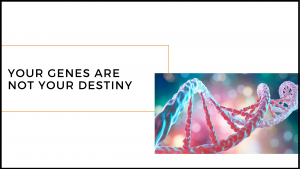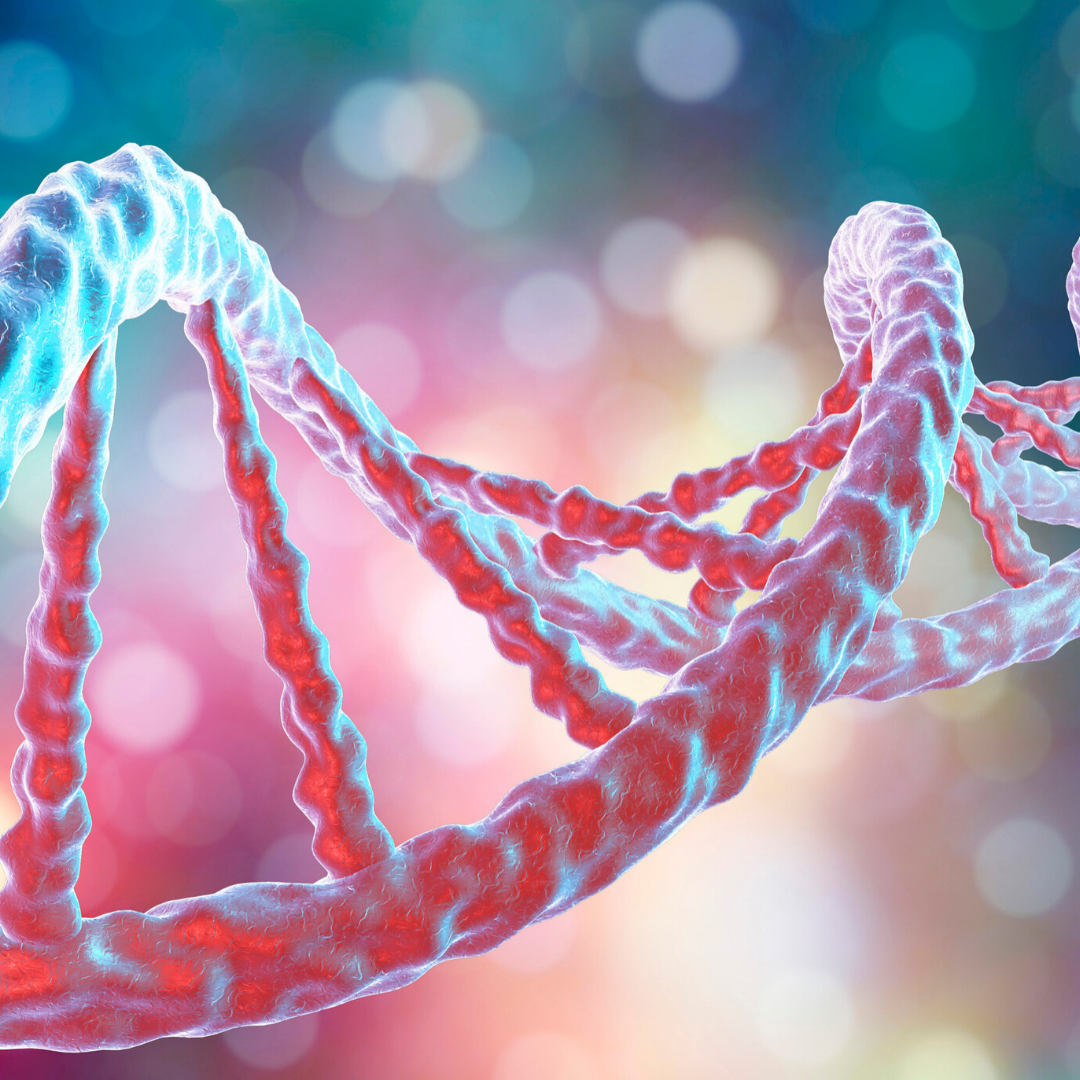Your Genes Are Not Your Destiny
Your Genes Are Not Your Destiny
Our Blog
Your Genes Are Not Your Destiny

Many of us have grown up with this notion that our health is out of our control. We think we can’t change our bodies or our health because of our genetics. If we are overweight or have diabetes, and come from a family with the same concerns, it becomes easy to dismiss the role that our lifestyle has, throw our hands up in the air and say that diet, exercise and self-care don’t matter. We think we are destined for a certain outcome and the prophecy is fulfilled.
The truth is that so much of our health is actually in our control. Of course we can’t change our genetics, but we can influence our genes and grant them their highest expression by how we eat, move and live. That’s what I want to talk about today. Repeat after me: “my genes are not my destiny.”
Keep reading to learn more about:
- Nature vs. nurture
- Epigenetics
- What are SNPs
- Action steps that influence your genes
Let’s get started!
Nature Vs. Nurture
It’s an age-old debate, but I think we have the winner: Nurture. The reason that the same health concerns tend to run in families may have to do with the similar lifestyle and habits that tend to be reinforced within the family circle.
When scientists finally sequenced the human genome in 2003, discovering that we have 20,000-25,000 genes, instead of the greater number originally thought, it was sort of an anticlimactic event in history and medicine. Although clearly some variations in genetics lead to certain diseases, unveiling the genome led to very little change in treatments for health concerns and chronic disease.
What we now know is that genes don’t tell the whole story. They might load the gun, but the environment pulls the trigger. Another way to think about this is your genome is all the books on the bookshelf, but the environment dictates which ones are taken down to read.
It is now estimated that your genes account for about 10 percent of disease and the environmental influences accounts for the other 90 percent. The good news is that your environment is largely in your control. How empowering!
Epigenetics
Epigenetics literally means “on top of genetics” and is the term that refers to the environmental piece of gene expression. How does the body decide what genes to express, or turn on or off? There are several mechanisms including methylation, histone modification and other biochemical processes in the body that signal to our DNA. This is happening all of the time in every cell.
Epigenetics helps us to see the interplay between our genes and our environment. How we live has a profound impact on our health. When you see research saying that eating more vegetables or high intensity interval training is good for your health, one reason is because these lifestyle practices change your genetic expression towards health and longevity. In disease, these genes may get turned off.
What About SNPs?
SNPs or single nucleotide polymorphisms is the latest area of research in genetics and one that is often explored in the field of functional medicine. A SNP (pronounced “snip”) is a small change in a gene where one DNA base gets swapped for another. In the big picture, SNPs are how we adapt to changing climates and circumstances over time, but since the human environment has changed much faster than our genetics, some of these SNPs meant for protection may cause issues. We can think of this phenomenon as an epigenetic mismatch of sorts.
Let’s talk about methylation for a minute. Methylation is a simple biochemical process that puts a methyl group onto a molecule. The body does this for detoxification, neurotransmitter production, amino acid metabolism and for turning on or off genes.
You may have heard of MTHFR (methylene tetrahydrofolate reductase), this is a key enzyme in the methylation pathway that requires folate, vitamin B12 and other nutrients to function properly. A large portion of the population has SNPs in the MTHFR gene (that is the code for the body to make this enzyme).
Certainly MTHFR SNPs impact methylation, but this is typically only with environmental factors too, such as a poor diet that doesn’t contain enough B vitamins or exposure to more toxins than the system can handle. It’s possible to have a MTHFR SNP, but have high functioning methylation. Why? Epigenetics.
I want to make a quick note here about the power of our thoughts. What we think about our body and our health affects our epigenetics. If we receive test results that say we have the MTHFR SNP or the BRCA gene that’s linked to breast cancer that may lead to some thoughts and fear about our future health. The stress of this information negatively affects our health.
It’s important to honor the mind-body-spirit connection especially in our modern times with so much genetic information at our fingertips. In my practice I walk the fine line. I think genetic information gives us helpful clues and pieces to your health puzzle, but I also want to treat you as a whole person and not just treat your genetics. Just because you have a gene or a variation in a gene, doesn’t mean that you’ll have a disease. We have to take a wider scope.
Action Steps
When it comes to creating the optimal environment for your genes to flourish, it really comes back to foundational lifestyle practices, ones that I write about here and speak with my patients about all of the time. I’m talking about:
- The food we eat
- The air we breathe and water we drink
- Our exposure to toxins and pollution
- How much and how often we exercise and move
- The quality and quantity of our sleep (link to sleep article)
- Our stress levels and how we manage it with self-care
- The health of our microbiome
Epigenetics plays a role across generations also. Your epigenetic expression is passed down from parents to children to influence their own genes. By taking care of yourself now, you’ll be taking care of your children and grandchildren to come. This final point is often a huge motivator to adopt more health-based habits.
If you are curious about the role that your genetics and your environment plays in your own health challenges and want to truly optimize your health, give me a call at my clinic, Unlimited Health Institute. I’d love to dive deeper into this conversation with you!


